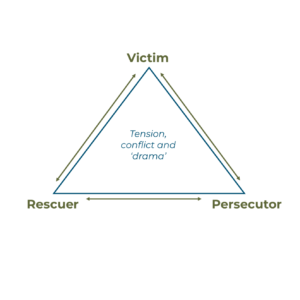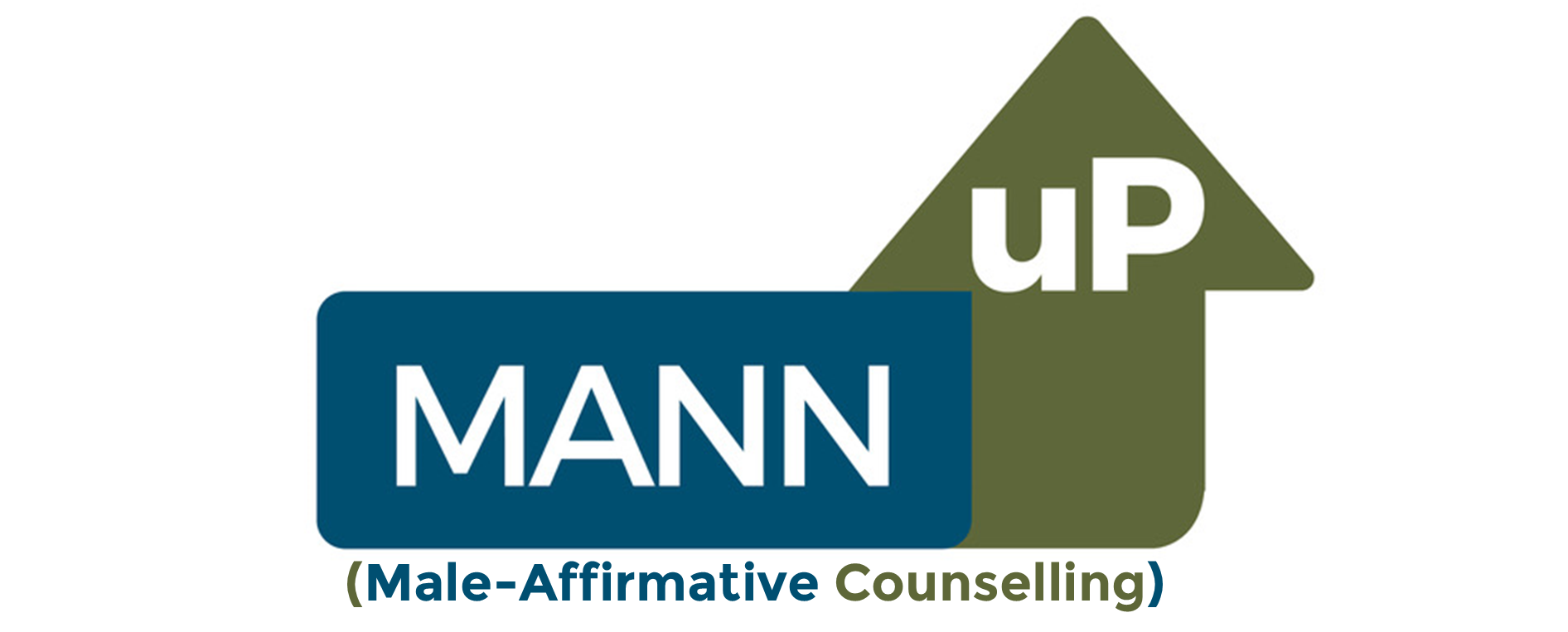Do you find that certain relationships in your life are always full of tension, anxiety or conflict? Are their people in your life you feel you always have to step in and save from peril? Or do you find yourself bring manipulated into being the ‘bad guy’ all the time? Could it be that you are caught up in an unhealthy relationship drama triangle?
WHAT IS THE DRAMA TRIANGLE
In the 1960s Stephen B. Karpman devised a 3 point framework known as the Drama Triangle, to illustrate how people can often unwittingly adopt one of the 3 positions or roles when interacting with others, especially at times of tension or conflict, and then unconsciously manipulate others into adopting one of the other positions on the triangle, which can amplify a sense of ‘drama’.
Karpman was a student of Eric Berne, the creator of a theory of human psychology and interrelating known as Transactional Analysis. Berne believed that we all as people operate in one of 3 ego states when ‘transacting’ with others. We are either interacting in the parent, adult or child ego state, often unconsciously influenced by the ego state the person we are ‘transacting’ with is operating in (e.g. if the person we are ‘transacting’ with is operating in the child ego state, we might unconsciously counter that by defaulting into the parent ego state).
Karpman’s Drama Triangle identified three distinctive roles that if participants fall into, or are manipulated into, can keep them trapped in ‘drama’ and which can inhibit personal growth, and the flourishing of relationships.
 The Victim: May not be an actual victim, but rather somebody who feels like they are one, or is acting like they are one. This will tend to initially appear as a submissive role, with the person feeling like they are powerless. They may present as needy, negative, fearful and have a low self-esteem.
The Victim: May not be an actual victim, but rather somebody who feels like they are one, or is acting like they are one. This will tend to initially appear as a submissive role, with the person feeling like they are powerless. They may present as needy, negative, fearful and have a low self-esteem.
The Rescuer: Tends to be one of life’s ‘fixers’ who likes to swop in and help out and be of assistance to others. Often times the rescuer needs to have someone to help to feel meaningful and wanted. They tend to focus on others’ needs over their own, and get a sense of feeling good for having tried to help.
The Persecutor: Tends to be seen as a bully, and can appear to be very angry and controlling, and will usually want to blame someone else for what is going wrong. They will justify their behaviour as a means to defend themselves, or because they feel they are in a ‘battle’ with another they must try to win.
Are you starting to recognise the role you or someone you are in a relationship with tends to adopt when you interact with each other especially at times of tension or conflict?
ENTERING INTO THE DRAMA TRIANGLE
People can enter or be drawn into the Drama Triangle from any of its 3 starting positions.
Entering in the Victim Role: This might be because the person is genuinely struggling, or they are feeling sorry for themselves and wanting some attention. The victim will actively seek out, or try to manipulate people they are already in a relationship with, to adopt the rescuer role and save them. A person who defaults to adopting the victim role in relationships, will also most likely seek out and be drawn to relationships with others who are rescuers by nature.
Entering in the Rescuer Role: This might be because the person genuinely wants to help somebody who seems to need it, or because they are looking for a distraction from their own life, and for someone to want and need them. A person who defaults to the rescuer role in relationships, will most likely seek out and be drawn to relationships with others who are victims by nature.
Entering in the Persecutor Role: This might be because the person is having a bad time or is feeling aggrieved and is looking for someone to take those feelings out on. This might then force those that person is in relationships with to adopt the victim role, because they are being persecuted for no good reason.
THE RISKS ATTACHED TO BEING CAUGHT IN THE DRAMA TRIANGLE
People can often gravitate towards and stay in fundamentally unhealthy relationships because they enable adoption of a position on the Drama Triangle, that although not fulfilling, is comfortable and familiar.
So if you have a habit of being a rescuer by nature, you may stick with and seek out relationships with victims. Good for them perhaps, but you may end up feeling like you are being constantly taken advantage of and even used, and doubt if others want you in their life for you, or for what you do for them.
Or if you tend to default to being the victim, and continually seeking out and letting others rescue you from life’s challenges and hard times, although this might give short term relief, it will disempower you from learning to fend for yourself, and may make you unduly reliant and beholden to others.
Be wary of moving positions in the Drama Triangle
Perhaps the biggest risk associated to being caught up in unhealthy or dysfunctional relationships that are representative of the Drama Triangle is that you, or other players, may suddenly shift position.
It could be the person who initially adopted the victim role suddenly shifts to become the persecutor, blaming the rescuer for holding them back (causing the rescuer to feel like a victim).
It could be the person who initially adopted the rescuer role suddenly shifts to become the persecutor, being angry or frustrated at the victim for relying on them so much.
Sometimes in order to remain the victim, a player may need to have someone to blame for their victimhood, be careful that you don’t enter the Drama Triangle as a rescuer, and then get manipulated into being the persecutor or persecuted.
HOW TO DISRUPT THE DRAMA TRIANGLE
Don’t Be a Victim, Be an Adopter: Focus on learning to do more for yourself and self-reliance, ask for assistance if needed, but don’t let others do everything for you.
Don’t Be a Rescuer, Be a Coach: Focus on helping to educate, empower and motivate others to do for themselves, rather than stepping in and doing it for them.
Don’t Be a Persecutor, Be a Challenger: Focus on encouragement of constructive reflection for self and others, and personal ownership of change, rather than always blaming others.
HOW TO BREAK FREE OF THE DRAMA TRIANGLE
Start by examining the relationships in your life and seeing if any of them occasionally or all the time fall into the dynamic of the Drama Triangle. What role(s) do others tend to adopt? What role(s) do you tend to adopt?
Now be honest with yourself, do you like to play the victim, rescuer or persecutor?
Often times when dysfunctional Drama Triangle relationships continue for a long time, it is because both sides are getting something out of it that taps into an unconscious need.
For a victim, being helped by others can be a means to reassure them somebody cares about them. For a rescuer, helping out can make them feel useful and that they will not be rejected as a result. For a persecutor, being angry to others can help relieve their inner tensions and if that person still stays with them, can provide a perverse reassurance that they must be loveable, as even when they treat someone badly, that person still sticks with them.
Resist your temptation, and the manipulation of others to enter into traditional victim, rescuer, persecutor roles, instead strive to act and encourage new adopter, coach and challenger roles instead.
Circle back into the theory of ego states in Transactional Analysis, try to hold yourself in the healthy adult ego state at all times, and expect and require others to interact with you in their healthy adult ego state. If someone has regressed into their child ego state, don’t feel you have to go there with them, or try to counter it by being a punitive parent, simply walk away until that person is behaving like a healthy adult and treating you (and themself) with respect.
HOW MANN UP CAN HELP
If you feel relationships in your life tend to fall all too often into the Drama Triangle framework, or if you feel you tend to default into a victim, rescuer or persecutor role, that in turn repeatedly attracts other victims, rescuers or persecutors into your life, participating in a personal programme can help you spot these patterns, and start to break the cycle.
Your personal programme can help you safely and confidentially examine the dynamics in your relationships, and work out what the healthy patterns of interactions should be, and how to help get there.
